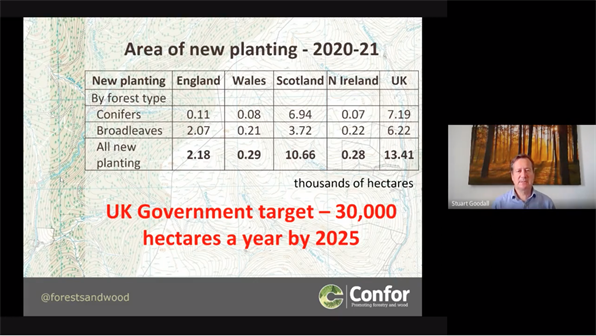Caroline Ayre, Confor’s National Manager for England, said the recently-published England Trees Action Plan had plenty of positive things to say about wood use, skills and rural jobs - but lacked enough ambition. To satisfy the “insatiable demand” for wood products, to decarbonise construction and tackle climate change, a majority of softwood planting was needed.
“We need to grow more wood for what we use, and that means softwood,” she said. “Yet the plan talks about a majority native broadleaf planting. We already have had significant amounts of broadleaf woodland planted, but very little planted of it to produce wood.”
She said Confor was committed to working with all partners to set up a new Industry Leadership Group in England and to create an industrial strategy for forestry to sit alongside the Action Plan.
Eilidh Forster of Bangor University spoke at the meeting about her new research paper, which concluded that productive forestry has a significant part to play in mitigating the impact of greenhouse gases - and deserves a “prominent role in climate policies”.
She said: “Commercial forestry can deliver significantly more net carbon benefits than more natural broadleaf systems in the same time period, up to two and a half times more in some cases.” (read the story and link to the report here).
The event also heard from APPG Vice-Chair Lord Carrington, who discussed woodland management challenges - and said although grey squirrels were undoubtedly a huge problem for broadleaf woodland, there was no appetite among the general public for their complete extermination. Watch the full video of the event here.


